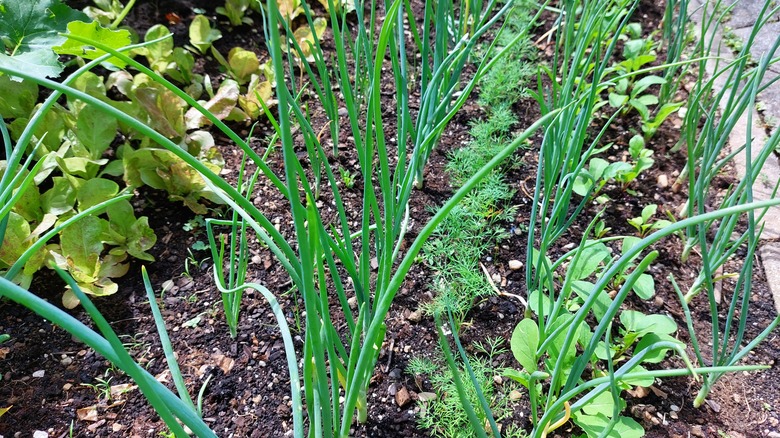Green onions are a lovely addition to the garden. Delicious in soups, salads, and stir-fries, having them on hand is always a treat. Dill, which also happens to make a lovely addition to most meals that call for green onions, is one of the best companion plants for green onions and even enhances the flavor. Not only does dill boost the taste profile of onions, but the effect works both ways.
Growing dill next to your green onions is a pro move that takes you to another level as a gardener because it’s a form of companion planting. This is one of the best ways to learn about and implement systems thinking, a central tenet of permaculture, and a more advanced form of gardening. Systems thinking is rooted in the idea that growing food should come from a holistic, whole-systems mindset where you are creating a self-sustaining ecosystem. Land, people, plants, and all living organisms are taken into consideration and integrated into a closed-loop system. Companion planting is an easy way to start viewing and treating your garden like a living ecosystem where each element interacts with and impacts the other, and interplanting green onions and dill is a great place to start!
The benefits of growing dill and onion together

Companion planting is almost as old as agriculture itself. When it comes to dill, in particular, companion planting can enhance the soil fauna and also offers a sustainable and responsible way to use the land. The biggest benefit is that dill and green onions have a unique relationship that impacts each other’s flavor profile, which is an all-around win. Additionally, dill attracts good bugs that help banish unwanted pests from your garden, including ladybugs, lacewigs, wasps, bees, and lady beetles.
In addition to the beneficial relationship these plants have with one another, they are also easy to grow together. Both can be sowed from seed and prefer full sun and well-draining soil, while onion won’t take any sunlight from the neighboring dill thanks to its unique narrow leaves. Dill should be sown in mid-spring to early summer and does not like being transplanted, so direct sowing is best. Green onions can be directly sown as well. However, succession planting is recommended since they are generally harvested from the root.
